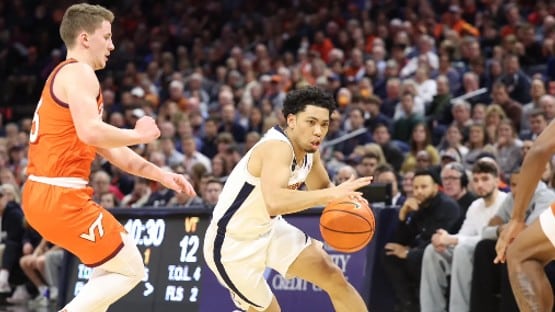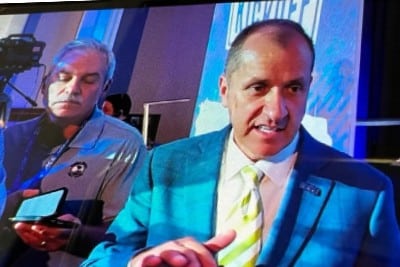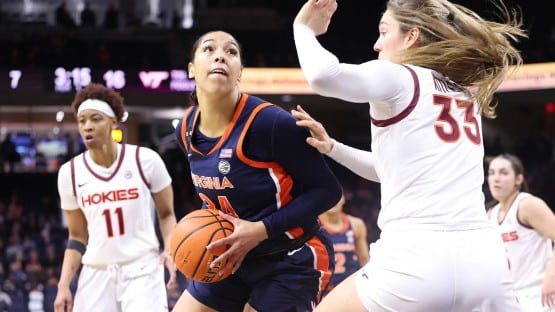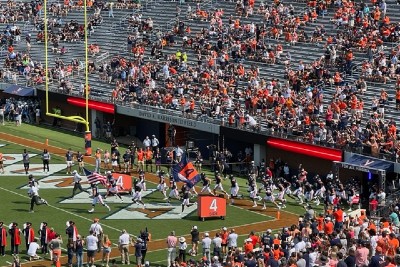
We know that UVA and Virginia Tech are among the seven, maybe eight, ACC schools that are looking at options for getting out of their grant-of-rights agreements.
And we know that they have talked with other conferences about possible landing spots if they could get through the grant-of-rights legal thicket.
What we don’t know now is what more on this we might know between now and mid-summer.
The last two summers brought us the out-of-nowhere news that Texas and Oklahoma would be bolting the Big 12 for the SEC (2021) and USC and UCLA were set to leave the Pac-12 for the Big 10 (2022).
There was nary a word about either of those two landscape-changing moves ahead of the announcements.
The talk about the Magnificent Seven Plus-1 could be smoke around the edge of the dormant volcano prefacing an upcoming eruption.
The brave face

Jim Phillips, the ACC commissioner, is Kevin Bacon in the parade scene at the end of “Animal House,” trying to convince us through the chaos that all is well.
At a press conference at the end of this week’s ACC spring meetings, the commish efforted to downplay the obvious, selling the ideas that “we’re all in this together,” and that the league’s presidents and ADs “believe in the ACC, and we want to continue to work together.”
He kinda has to say that, though, given the backdrop.
The news that UVA, Virginia Tech and the rest of the Magnificent Seven – UNC, NC State, Clemson, Florida State and Miami, and throw in Louisville, the Plus-1 – had been cooperating on their efforts to explore their legal options to get out of the grant of rights, not surprisingly, blindsided the other seven schools.
We’re told that the revelation led to a rather ripe discussion on Monday, and while the meetings ended on Wednesday with everybody playing nice, coalescing around the notion that the conference can do some things to appease the schools who have been looking at their options for leaving by throwing some more money their way, it’s obvious that the ship is taking on water.
“These are schools that are under a lot of stress and lot of pressures, and I understand that, I really do,” Phillips said. “The reality is, our conference is third in the country in distribution, third, and as we look at the projections, at least in this decade, we’re going to continue to be there. Now, we want to close the gap. We need to close the gap between the top two conferences that have started to run away from us.”
Why schools are looking for an out

That’s the challenge, and just to be clear about this, there’s no way to make this actually happen, given the reality of the 20-year deal that the ACC signed with ESPN back in 2016.
It wasn’t even a good deal in 2016, locking the ACC into being a distant third to the SEC and Big Ten in the here and now – in the 2020-2021 academic sports year, the ACC distributed an average of $36.1 million to its members; the SEC paid out $54.6 million per school, and the Big Ten paid $54.3 million a year to its schools.
And it’s going to get worse. According to market research from Navigate, the SEC will be paying out $105 million per year per school, the Big Ten will pay out $94.5 million, and the ACC will be an even more distant third, at $55.3 million.
Phillips talked up efforts by the conference to look for new ways to bring in revenue, but the main way is through media rights, and the media rights are locked for 13 more years.
Less money means less money for coaches, for recruiting budgets, for travel – bus trips instead of charter flights, charter flights with budget airlines that leave you sitting on the tarmac for a couple of hours after a night game in Miami, forcing kids to miss class the next morning.
The impact isn’t just felt in football and men’s basketball. Maybe Olympic sports don’t get all their assistant coaching positions funded. Maybe you end up dropping sports because you can’t afford them anymore.
And then, yeah, in football and men’s basketball. Maybe you lose an assistant to the Big Ten who ends up recruiting kids out from under you in your backyard, or you go with the cheaper in-house option because even a Rutgers or Vandy has more money to throw at the guy you wanted to hire.
Phillips, master of putting on the good public face, did his best to spin this one.
“We’ve got to close that gap, for sure. For sure. But at the end of the day, as our people say, how much do you need to be a national champion in football and basketball and all the other sports?” the commish told reporters.
“Do you have to spend the most to be the best? I don’t know that there’s been an equation that’s connected the two. It certainly is helpful, and it certainly allows you a greater chance.”
Fact check

Yeah, it’s time for a fact check here: we’re already feeling the effects of just being $18 million and change behind.
The ACC hasn’t had a team (read: Clemson) in the College Football Playoff the past two years, and we’ve had just five bids to each of the past two NCAA Tournaments.
CFP invites for the Big Ten and SEC the past two years: six.
NCAA Tournament bids for the Big Ten and SEC the past two years: 31.
We’re five years away from being $40 million to $50 million per year per school behind, and all we can do is redistribute our smaller pie so that some schools are only maybe $30 million to $40 million per year behind.
That’s why you’re seeing UVA, Virginia Tech and other ACC schools looking at what they can do to address how they can try to find a new path forward.
The next six to eight weeks should be interesting on the breaking sports news beat.










